I love Easter weekend. It has always instilled in me a hope for which I find myself yearning much of the rest of the year. One of my traditions is that I watch King of Kings as many times as schedule allows (which I admit means fewer and fewer viewings as the years go by, but always at least once, in its entirety). This movie may not be the best production surrounding the life of Christ, his death and the Resurrection, but no one will ever have portrayed a better Jesus for me than actor Jeffrey Hunter (the fact that he portrayed Captain Christopher Pike in the pilot episode of the original Star Trek notwithstanding). Even as a child, he was Jesus to me.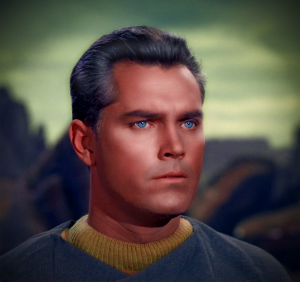
So yeah, I admit, this is a special weekend for me. However, the book I am here to recommend isn’t what many consider to be THE “good book”. This is a blog about writing. I don’t blog about religion, politics, or (anymore) the <challenge whose name shall not be spoken>.
But I do usually post a blog on Friday and I do like a (good) play on words, so I thought to myself, for a writer, what is the “Good Book”? There was a funny answer waiting for me and I didn’t even realize it until I started the blog (yes, yes, I am a total pantser, even when it comes to blogging): I started a blog months ago on this very subject that I never completed. I even actually DID (swear) use the term “Good Book” (exactly as copied and pasted below).
SO, I will submit, for the writer, if you aren’t carrying a copy of this masterpiece around in your hip pocket, I am only left to wonder why?
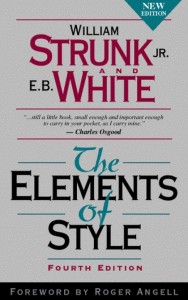 Many moons ago I DID write about the <challenge whose name shall not be spoken> (and I needed a new flak jacket and fresh foxhole once the mortars stopped lobbing in). Many of the comments were civil and certainly got me to thinking. One barb, however, stuck longer than any other. One disgruntled reader told me I ought to get myself a copy of Strunk & White’s Elements of Style.
Many moons ago I DID write about the <challenge whose name shall not be spoken> (and I needed a new flak jacket and fresh foxhole once the mortars stopped lobbing in). Many of the comments were civil and certainly got me to thinking. One barb, however, stuck longer than any other. One disgruntled reader told me I ought to get myself a copy of Strunk & White’s Elements of Style.
Wow. I thought they outlawed slugging below the waistline in the blogosphere. You don’t accuse a preacher of needing to get a copy of the (actual) Good Book, and you don’t tell a writer they should discover E.B. White and William Strunk, Jr.’s elemental CLASSIC. It’s sacrilegious. (Of course I am doing the same by implying the possibility that one of you dear writer-readers may not know the book—trust me, the dark, ironic humor of that fact hasn’t escaped me.)
Much of the sting from the comment could be attributed to its irony, however. I am a Strunk & White GEEK. I don’t have just one copy, I have several. I buy the updated version whenever there is one (the first came out in 1918).
The dang thing is reading material in my bathroom.
That’s right. I used to read the dang thing as if it were the Sunday paper.
I’d rather argue infer versus imply with you than politics, religion, or the any other sacred cow.
Which brings me to my next question:
Do you know the difference between infer and imply?
You’d better. And you could do a lot worse as a writer than to sit down this weekend whilst being thankful and read (or, more hopefully, RE-read) S&W’s good, good book.
Of course, for us—the writers—there are other must reads. I’d feel remiss if I didn’t toss a few more out there for those of you kind enough to be reading my Friday afternoon words.
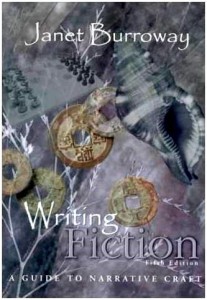 A book no writer should miss is Janet Burroway’s Writing Fiction: A Guide to Narrative Craft. The reason (or summary of why) I recommend so highly is in the title. What we do here, a handful of scrubs aside, is practice a narrative craft. In fact (and Burroway agrees with me on this), the better we becomes at our craft the more meritorious becomes the narrative but the less obvious becomes the narraTOR. Burroway, like me, believes very strongly in the creation of character through mannerisms, dialogue, gesture, inflection, cadence, stature, and a hundred other “show don’t tell” mechanisms. I love her idiom for characterization: The Flesh Made Word. She says this:
A book no writer should miss is Janet Burroway’s Writing Fiction: A Guide to Narrative Craft. The reason (or summary of why) I recommend so highly is in the title. What we do here, a handful of scrubs aside, is practice a narrative craft. In fact (and Burroway agrees with me on this), the better we becomes at our craft the more meritorious becomes the narrative but the less obvious becomes the narraTOR. Burroway, like me, believes very strongly in the creation of character through mannerisms, dialogue, gesture, inflection, cadence, stature, and a hundred other “show don’t tell” mechanisms. I love her idiom for characterization: The Flesh Made Word. She says this:
“Appearances and actions reveal, which is one thing meant by showing rather than telling in fiction. But characters also reveal themselves in the way they speak and think, and the revelation is more profound when when they are also shown in these ways.”
Don’t miss that one: The revelation is more profound when they are also shown in these ways. A limp handshake; the softness of a cheek—the taste, smell, feel, ideologies, and perhaps most important of all, the character’s weaknesses and failures. These shape and solidify a character for us as much as any description of physical stature, eye color, hair length, or tooth condition.
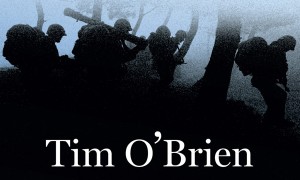 Burroway deserves commendation for the fact alone that she recommends (and includes for study) the short story The Things They Carried by Tim O’Brien. To read O’Brien’s masterpiece of fiction (which is actually the first chapter of an entire book but is so good it stands alone as example of greatness, and for what we should all be striving) is to learn something in the reading. To read it again and again, as have many of us, is to become a student to the master. I gain a different admiration for the work each time I sit down to enjoy every word of it. From O’Brien:
Burroway deserves commendation for the fact alone that she recommends (and includes for study) the short story The Things They Carried by Tim O’Brien. To read O’Brien’s masterpiece of fiction (which is actually the first chapter of an entire book but is so good it stands alone as example of greatness, and for what we should all be striving) is to learn something in the reading. To read it again and again, as have many of us, is to become a student to the master. I gain a different admiration for the work each time I sit down to enjoy every word of it. From O’Brien:
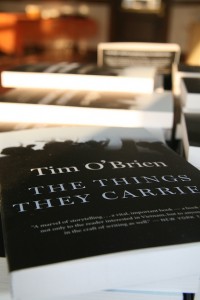 They carried USO stationery and pencils and pens. They carried Sterno, safety pins, trip flares, signal flares, spools of wire, razor blades, chewing tobacco, liberated joss sticks and statuettes of the sniffing Buddha, candles, grease pencils, The Stars and Stripes, fingernail clippers, Psy Ops leaflets, bush hats, bolos, and much more. Twice a week, when the resupply choppers came in, they carried hot chow in green Mermite cans and large canvas bags filled with iced beer and soda pop. They carried plastic water containers, each with a two gallon capacity. Mitchell Sanders carried a set of starched tiger fatigues for special occasions. Henry Dobbins carried Black Flag insecticide. Dave Jensen carried empty sandbags that could be filled at night for added protection. Lee Strunk carried tanning lotion. Some things they carried in common. Taking turns, they carried the big PRC-77 scrambler radio, which weighed thirty pounds with its battery. They shared the weight of memory. They took up what others could no longer bear, Often, they carried each other, the wounded or weak. They carried infections. They carried chess sets, basketballs, Vietnamese English dictionaries, insignia of rank, Bronze Stars and Purple Hearts, plastic cards imprinted with the Code of Conduct. They carried diseases, among them malaria and dysentery. They carried lice and ringworm and leeches and paddy algae and various rots and molds. They carried the land itself. Vietnam, the place, the sod -a powdery orange-red dust that covered their boots and fatigues and faces. They carried the sky. The whole atmosphere, they carried it, the humidity, the monsoons, the stink of fungus and decay, all of it, they carried gravity…
They carried USO stationery and pencils and pens. They carried Sterno, safety pins, trip flares, signal flares, spools of wire, razor blades, chewing tobacco, liberated joss sticks and statuettes of the sniffing Buddha, candles, grease pencils, The Stars and Stripes, fingernail clippers, Psy Ops leaflets, bush hats, bolos, and much more. Twice a week, when the resupply choppers came in, they carried hot chow in green Mermite cans and large canvas bags filled with iced beer and soda pop. They carried plastic water containers, each with a two gallon capacity. Mitchell Sanders carried a set of starched tiger fatigues for special occasions. Henry Dobbins carried Black Flag insecticide. Dave Jensen carried empty sandbags that could be filled at night for added protection. Lee Strunk carried tanning lotion. Some things they carried in common. Taking turns, they carried the big PRC-77 scrambler radio, which weighed thirty pounds with its battery. They shared the weight of memory. They took up what others could no longer bear, Often, they carried each other, the wounded or weak. They carried infections. They carried chess sets, basketballs, Vietnamese English dictionaries, insignia of rank, Bronze Stars and Purple Hearts, plastic cards imprinted with the Code of Conduct. They carried diseases, among them malaria and dysentery. They carried lice and ringworm and leeches and paddy algae and various rots and molds. They carried the land itself. Vietnam, the place, the sod -a powdery orange-red dust that covered their boots and fatigues and faces. They carried the sky. The whole atmosphere, they carried it, the humidity, the monsoons, the stink of fungus and decay, all of it, they carried gravity…
…They had no sense of strategy or mission. They searched the villages without knowing what to look for, nor caring, kicking over jars of rice, frisking children and old men, blowing tunnels, sometimes setting fires and sometimes not, then forming up and moving on to the next village, then other villages, where it would always be the same. They carried their own lives. The pressures were enormous. In the heat of early afternoon, they would remove their helmets and flak jackets, walking bare, which was dangerous but which helped ease the strain. They would often discard things along the route of march. Purely for comfort, they would throw away rations, blow their Claymores and grenades, no matter, because by nightfall the resupply choppers would arrive with more of the same, then a day or two later still more, fresh watermelons and crates of ammunition and sunglasses and woolen sweaters-the resources were stunning -sparklers for the Fourth of July, colored eggs for Easter. It was the great American war chest-the fruits of sciences, the smokestacks, the canneries, the arsenals at Hartford, the Minnesota forests, the machine shops, the vast fields of corn and wheat they carried like freight trains; they carried it on their backs and shoulders-and for all the ambiguities of Vietnam, all the mysteries and unknowns, there was at least the single abiding certainty that they would never be at a loss for things to carry.
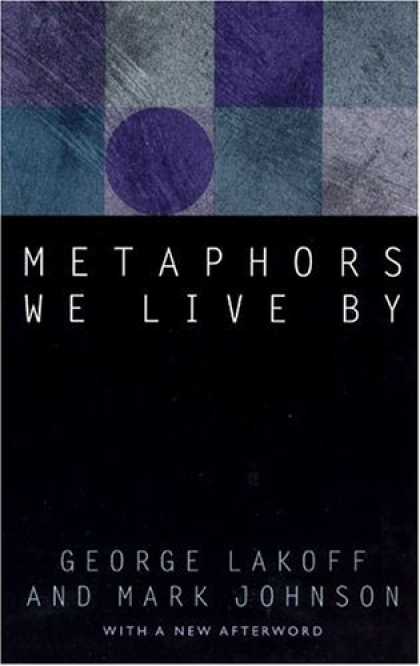 Metaphors We Live By, by George Lakoff and Mark Johnson is a classic study of the metaphor as a necessity of description tied not only to the written word but to everyday life. “…most people think they can get along perfectly well without a metaphor. We have found, on the contrary, the metaphor is pervasive in everyday life, not just in language but in thought and action. Our ordinary conceptual system, in terms of which we both think and act, is fundamentally metaphorical in nature.” (italics mine)
Metaphors We Live By, by George Lakoff and Mark Johnson is a classic study of the metaphor as a necessity of description tied not only to the written word but to everyday life. “…most people think they can get along perfectly well without a metaphor. We have found, on the contrary, the metaphor is pervasive in everyday life, not just in language but in thought and action. Our ordinary conceptual system, in terms of which we both think and act, is fundamentally metaphorical in nature.” (italics mine)
A must read for the serious writer.
Other great books? Of course, Stephen King’s sparse but strangely profound sharing of his own journey, On Writing, is a necessary read for the burgeoning writer. There is The Writing Life by Annie Dillard, Writing Down the Bones by Natalie Goldberg, and Bird by Bird: Some Instructions on Writing and Life by Anne Lamott.
And there are countless others. I myself found an interesting book of writing exercises (if you’re into that sort of thing): The 3 A.M. Epiphany by Brian Kiteley. Also a GREAT read and practically equal to its vaunted title The Portable MFA in Creative Writing produced by The New York Writers Workshop.
The point is, we must not give up on our craft (or stop treating it like a craft or an art). We must continuously hone, practice, study, ask, criticize, and no matter what anyone tells you, write, write, write, write, and when your fingers are cramped and bleeding, your mind is mush, you’ve nearly foresworn the very thing you adore, write some more.
Happy Easter.



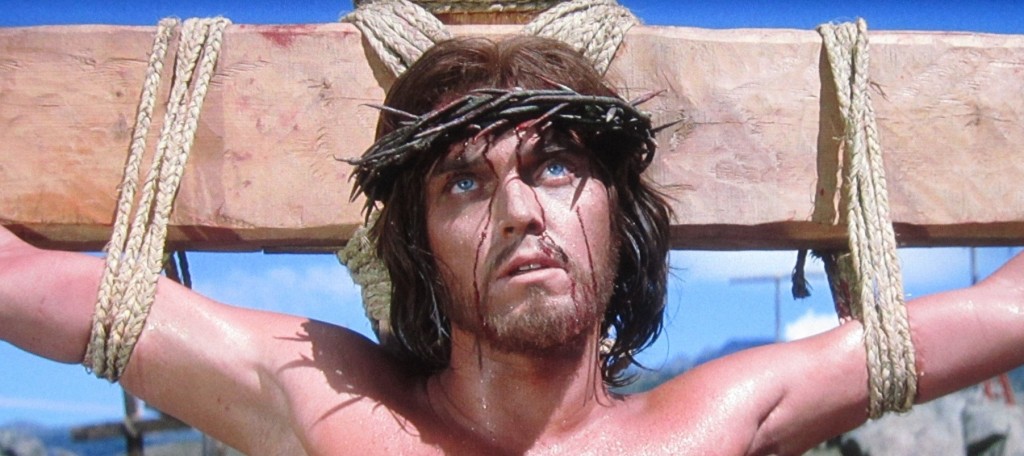
Didnt know that about Hunter ( I knew him as Christopher Pike)
Happy Easter Rob
Thanks, Leslie….Happy Easter to you, too. BTW, he was also in arguably the greatest John Wayne Western ever, The Searchers. (I think he did more Westerns than anything else, actually.)
I remember him as Pike and he was cute back then, but a blue eyed Jesus..?